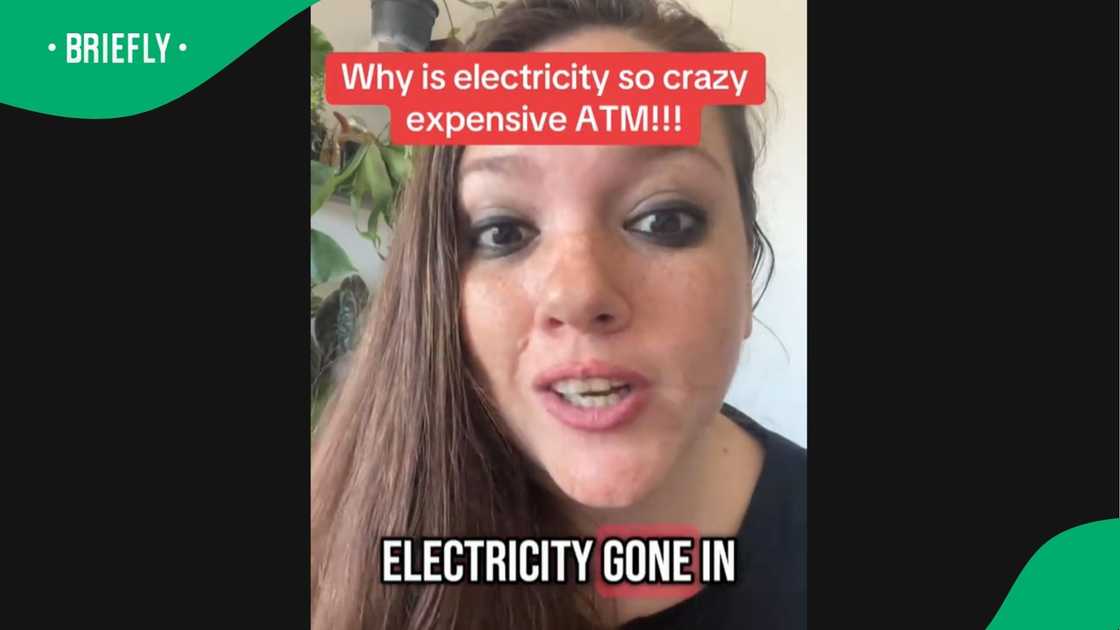“R2 to R7 per Unit”: Gqeberha Woman Explains Why People Pay Different Rates for Units of Electricity
- A Gqeberha content creator broke down why South Africans are paying different prices for electricity across the country
- The Eastern Cape woman's video explained that South Africans pay between R2 and R7 per unit, depending on where they live
- Her detailed breakdown of Eskom's pricing system and possible solutions sparked hundreds of comments from frustrated South Africans

Source: TikTok
A young woman from Gqeberha in the Eastern Cape took to social media to answer the question on every South African's mind: why are we paying so much for electricity? Content creator @carribloom, who regularly shares news and information about issues affecting South Africans, posted a video on 4 July 2025 that went viral with over 5,000 reactions and hundreds of comments. Her caption read:
"Why #eskom #electricity is so expensive."
In the video, she explained that South Africa is a developing country, yet the electricity prices are among the highest in the developing world. South Africans pay anywhere between R2 and R7 per unit, and a unit is measured as a kilowatt-hour. The massive difference in prices across different areas comes down to three main players: Eskom, NERSA (the National Energy Regulator), and the local municipality. She explained that Eskom is the state-owned company that produces electricity, NERSA decides how much Eskom can increase prices, and municipalities buy electricity from Eskom before selling it to residents.

Read also
"There's power?": American's reaction to seeing buildings in SA has Mzansi questioning US education
The real problem, she revealed, is that municipalities don't just pass on the cost. They add their own markup, sometimes as much as 50%, because as of 2024, municipalities owe Eskom around R70 million in debt. They're using taxpayers' money to pay off what they owe.
She pointed to several reasons for the high costs: ageing infrastructure with pylons falling and substations exploding due to poor maintenance linked to state capture, illegal connections where people steal electricity, and the cost of running generators with diesel to prevent blackouts. When oil prices jumped 13% after international incidents, that cost got passed on to consumers, too.

Source: TikTok
SA shares electricity struggles
@ballistic135 advised:
"R250 gives me a full month. Invest in solar. Trust me. It's a lifesaver."
@camiswart shared:
"I managed to use R300 of units for 28 days."
@therealinvaderx pointed out:
"In 1991, South Africa had almost the cheapest electricity in the world."
@nikkie wrote:
"The prices are high because others are looting it for free."
@user78978377451 joked:
"Come to the township, everything is free."
@vernieg revealed:
"I'm an electrician and you will be shocked if you see how many people are stealing electricity in middle and lower income households 😳"

Read also
"SA is a movie": Pretoria's Mrs Bullock disturbed by alleged R2 billion Tembisa hospital scandal
@ang complained:
"We spend 6000 a month and 200 a day, madness!!!"
@user_37543218 asked:
"Thank you, you have been a great help. Tell me, does putting the geyser off for some time and then putting it on again to warm up pull off a lot of units?"
Protests force government action
According to Polity, electricity prices in South Africa have shot up at four times the rate of inflation over the past 25 years, making it completely unaffordable for low-income families who spend up to 20% of their household income on energy.
Millions of unemployed South Africans surviving on a R370 monthly grant cannot pay for electricity and still afford food and shelter. Working-class communities like Thembisa in Gauteng recently protested when the local government tried to charge families a fixed R126 monthly electricity fee. Within a day of residents occupying roads and shutting down the area, the mayor scrapped the fee.
The Gqeberha content creator, @carribloom, suggested three possible solutions in her video. First, the government should open the grid to private companies, just like what happened with Telkom and fibre internet, which made South Africa's fibre costs among the cheapest in the world.
Second, residents should ask their municipalities about the markup being charged on electricity. Third, people could invest in solar panels, though she admitted this is extremely expensive for most households. Wind turbines work well in areas like Jeffreys Bay, but aren't practical for home use.
Watch the TikTok clip below:
More electricity-related news in SA
- Briefly News recently reported on a Johannesburg electricity expert who warned about NERSA's calculation error, and the mistake will cost South Africans much more than anyone expected.
- A Johannesburg man shared tips for cutting electricity costs on lighting by up to 80%, and his smart plug solution had people rushing to find out where to buy them.
- South Africans debated what salary is needed to live decently in the current economy, and the answers revealed just how much the rising cost of basic services is hurting households.
PAY ATTENTION: Follow Briefly News on Twitter and never miss the hottest topics! Find us at @brieflyza!
Source: Briefly News


